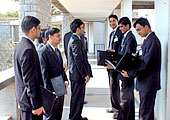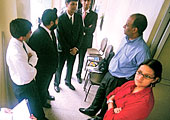 |
|
IIM-A
Deutsche Bank plonked down a cool Rs 1 crore to pick
up a student from India's hottest B-school
|
 |
IIM-B
The dons of Banerghatta decided not to disclose any information
about their placements this year |
It
wasn't very different this year, even with all the hoopla surrounding
them, that is. It had its usual share of 'Crorepati Graduates'
and 23-year-olds renouncing dollar dreams, a few IIM students
turning entrepreneurs and the media doing what it does best, hyping
all of it up. All was well with the world of placements. Or was
it?
Placements 2007 at the top Indian B-schools
took off from the year before on a marginally more upbeat note,
despite a booming job market. The placement scenario was just
as expected-the due rise in salaries, the usual companies making
a beeline to campuses to recruit students with a few new national
and international corporate names thrown in, some senior leadership
roles offered, and a smattering of associate profiles in international
I-Banks and consulting firms.
In other words, ho-hum. "The average
salary hike across the top institutes this year was 15-20 per
cent," reckons Santrupt Misra, Director, Aditya Birla Management
Corporation. Misra's group has hired about 50 graduates from the
IIMs and other top rung B-schools at packages between Rs 14.5
lakh and Rs 18.5 lakh per annum. While for the regular two-year
MBA, Indian salaries across the top 20 B-schools averaged between
Rs 7 lakh and Rs 14.2 lakh p.a., those accepting foreign offers
took home anywhere between $31,200 and $115,300 p.a., with the
highest offer a record $250,000 P.A at IIM Calcutta. On the other
hand, the one-year executive MBA (PGPX) programme started by the
IIM-A has done well. The average Indian salary at IIM-A (for PGPX)
crossed the Rs 24-lakh mark and foreign offers fetched an average
of $135,000.
 |
|
IIM-C
It was one of the 'Joka' grads that bagged the highest
dollar offer of 250,000 this year
|
 |
ISB
Class of 2007 made some unconventional career choices, including
non-profit organizations |
Some recruiters, however, point out that despite
handsome pre-placement offers and eye-popping salaries on Days
Zero and One, even some of the better-known B-schools had to work
hard to place students on the third and fourth days. The stark
difference between the highest rupee salary of Rs 1 crore and
the average figure of Rs 13.6 lakh (for IIM-A) only lends credence
to this notion. It suggests that up to 70 per cent of the class
would have got placed at levels significantly below the average.
One reason for the relatively meagre averages could be the fact
that most mid-size companies, which may have on offer interesting
job profiles, cannot always offer big-ticket payouts. Quips Ram
Sarvepalli, Partner, Ernst & Young (E&Y): "Average
salary figures were primarily ratcheted up by offshoring companies,
as they had unexciting job profiles on the table."
This year, top Indian B-schools have been
quite tight-lipped about divulging placement data to the media.
In fact, the high decibel publicity given to placements and salaries
may already be having its fallout, with several companies deciding
to stay away from the placement process. "High salaries coupled
with retention issues forced us to stay away from the IIMs this
year," says S.Y. Siddiqui, Head (HR), Maruti.
The performance of most top institutes this
year would at best be rated 'average.' The trend of opting for
Indian locations, which started a couple of years ago, was again
evident this year. Many students claim to have been inspired by
the quality of work, range of opportunities and challenges available,
and the variety that it offered to stay back in India. That's
good news for companies in India.
THE ONE-YEAR MBAS
They are becoming more credible. |
| With
a batch of 416 students, the Indian School of Business (ISB),
Hyderabad attracted 584 job offers this year with the highest
international CTC at $269,000 (with an average of $135,000).
The highest domestic offer, at Rs 43.91 lakh, saw a 30 per
cent increase over last year. Great Lakes Institute of Management
(GLIM), Chennai, another school that offers a one-year MBA,
has seen the average salary jump from Rs 7.4 lakh a couple
of years ago to Rs 9.3 lakh. "Although we may not have
the kind of branding major B-schools have, we are getting
recognised for what we offer," says Swaminathan Murthy,
the placement director at GLIM.
Numbers do not reveal the whole story. At ISB, for instance,
it was career shifts that stood out this year. NIIT recruited
two groups of students as core management teams to run standalone
businesses. On the other end, at least five students chose
to join microfinance institutions and NGOs. GLIM, which
currently runs out of a makeshift facility (a new campus
is coming up on the outskirts of Chennai), has already attracted
some of the leading IT companies, which form the bulk of
recruiters.
This was also the year when IIM Ahmedabad graduated its
first batch of one-year MBA (PGPX) students. Apparently,
the highest domestic salary offered was upwards of Rs 50
lakh (average offer was about half of it) and made by a
private equity firm. The PGPX students BT spoke with seemed
very happy with the programme, especially with the integration
the institute had managed with its flagship PGP course.
|
|








